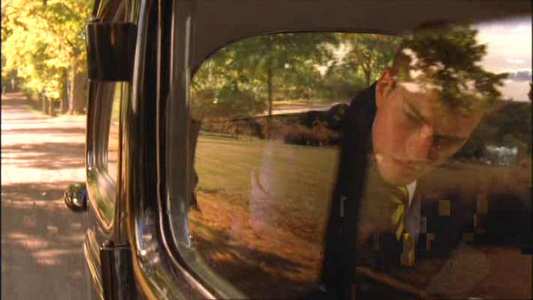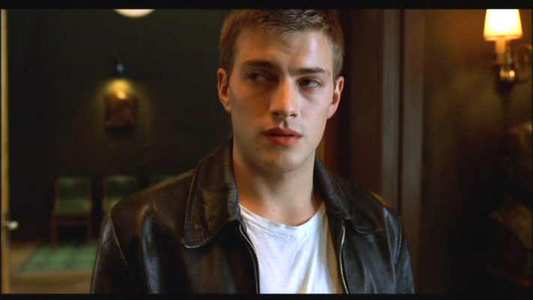Review of Evil
Introduction
Ondskan (Evil) is Jan Guillou`s autobiographical novel of his experiences at boarding school. It is one of Sweden`s best selling novels, yet it took nearly 20 years for it to come to the screen. My personal world tour of cinema continues with my first experience of Swedish cinema. What a film to start with!
Erik Ponti is a troubled teen. His stepfather brutally abuses him while his mother turns a blind eye in denial. He channels his own frustration and rage into the school yard, where his propensity to violence gets him expelled and banned from any school in the Stockholm area. He has one final chance to get an education, when his mother sells some of her possessions to fund a year in an exclusive boarding school. An educational establishment for the elite aristocracy of Sweden, the rules here are markedly different. While the teachers provide the education, it falls on the students to maintain discipline among themselves. This is a regime where the sixth-formers dictate orders and dispense punishment at their own whim. Erik is determined to keep his head down and graduate to honour his mother`s trust, but he isn`t about to be become a victim of the sixth-formers` warped values system either. When he keeps standing up to the irrational rules, he becomes even more of a target. Fortunately he finds a friend in roommate Pierre Tanguy.

Video
Evil gets a splendid 1.85:1 anamorphic transfer from Metrodome. A recent film gets an unblemished presentation, with the image crystal clear and pin sharp throughout. The colours are strong and grain is absent. If anything, the image is excessively sharp, and there are instances of artefacts related to that, some minor aliasing, moiré and shimmer. However these are rare indeed and do little to mar the quality of the picture. Evil has a period fifties look that comes across well in the costume and set design. It doesn`t call attention to itself; rather it is an understated character of the film that just seems part of the story.

Audio
You have a choice between DD 2.0 and DD 5.1 soundtracks. The Swedish dialogue is clear throughout, and naturally English subtitles are provided for UK consumption. This is more of a dialogue oriented film, so understandably the sound is fairly front focussed. That said, the surrounds are put to use conveying some of the period ambience, as well as the gentle and poignant soundtrack. As well as Francis Shaw`s score, there are some period tunes from the likes of Buddy Holly and his contemporaries.

Features
What disc wouldn`t be complete without animated menus and theatrical trailers? However there are some other extras to give the film some context.
Prominent is an interview with Jan Guillou that lasts 35 minutes. Guillou is the author of the original novel, and the man on whose life this film is based. He goes into his own history, and how accurate a portrayal the novel and film are. He also points out the dramatic licence. He talks about the difficulty of getting the film made, and his view on boarding schools in general. He`s also discusses his philosophy when it comes to violence. It is an interesting interview and a worthy addition to the film.
Behind The Scenes lasts 24 minutes, and features behind the scenes footage, interviews with the cast and crew, as well as clips from the film. It`s pretty much your standard EPK fare, and is informative, if a little light. One drawback is that Guillou`s contribution to this featurette is edited from the previous interview.
Finally there are three deleted scenes lasting 4 minutes in total. These are good character scenes, and it is a shame that they were cut, it must be noted that the subtitles were woefully out of sync for these.

Conclusion
Evil is an excellent, multi-layered intelligent film that doesn`t cease to engage. It should also be made compulsory viewing for all those who after reading a Harry Potter book start pestering their parents for a lifetime of boarding school education, but that`s another matter. I`ve seen this film described as Dead Poet`s Society meets Lord Of The Flies, but it transcends both of these films through some strong characterisations and an utter lack of schmaltz. Its strength is a powerful performance, tinged with nuance from Andreas Wilson as Erik Ponti. His introduction is brutal yet ambiguous, as he deals out some bloody violence that leads to him being expelled. He is at once set up as the villain of the piece, yet in the next scene that assumption is dispelled as we learn of his abusive relationship with his stepfather. It`s a chilling touch when we see him removed to the other room for some discipline, and his mother turns to the piano to drown out the sound of the belt.
For Erik to be sent to boarding school is almost an escape. He certainly doesn`t want to return home to his stepfather, and he doesn`t want to let his mother down. Yet his introduction to school isn`t a pleasant one as he encounters the warped discipline that the senior students dole out to the juniors. This is his last chance at an education and he doesn`t want to blow it. From the first scene of the film, we have seen that he can take care of himself. Yet in this school striking an elder student is immediate grounds for expulsion, while the teachers turn a blind eye to what goes on outside the classroom. For the first time in his life he has to restrain his tendency to react with his fists. He has to fit in to this culture of violence and intimidation, perpetuated by the tormented juniors inevitably becoming the seniors who torment. During his time there, his particular bugbears are Otto Silverhielm and his toady Dahlén. Erik decides to ignore the torments and concentrate on his work, but for Silverhielm and his ilk, non-cooperation is the same as rebellion, and pretty soon they are singling Erik out for special treatment. The violence and humiliations escalate and they aren`t pleasant to watch.
Fortunately, Erik finds friendship in his roommate Pierre, and even a little illicit romance with Finnish kitchen girl Marja. With their calming influences he can manage to restrain himself and endure the torment. Pierre even introduces Erik to the writings of Gandhi and the benefits of passive resistance. It`s a sign of the depth of the story that it exposes the flaw in Gandhi`s argument. Passive resistance works if your oppressor wants something from you, even if it is something as immaterial as obedience. But when your oppressor is tormenting you merely for his own sadistic thrill, then passive resistance becomes irrelevant.
Silverhielm and Erik`s confrontation goes beyond hazing as the former insists on proving himself dominant, while Erik refuses to be drawn in. It`s Erik`s growth as a character that makes this film so compelling. It`s how his experiences at this boarding school temper him, make him learn to control his aggression and seek other options to resist. When the moment comes, it is emotionally satisfying to see him respond in kind to the violence of the seniors, but when it ultimately comes to resolving the situation in that boarding school, he has to look elsewhere for answers.
Evil is an excellent film that is well worth watching. While the situation shown here is hardly original, the intelligent and brutally honest treatment that the subject receives certainly is. The film`s strength lies in its characterisations, with a central performance from Andreas Wilson that carries the film. Evil should be on everyone`s to watch list.
Your Opinions and Comments
Be the first to post a comment!